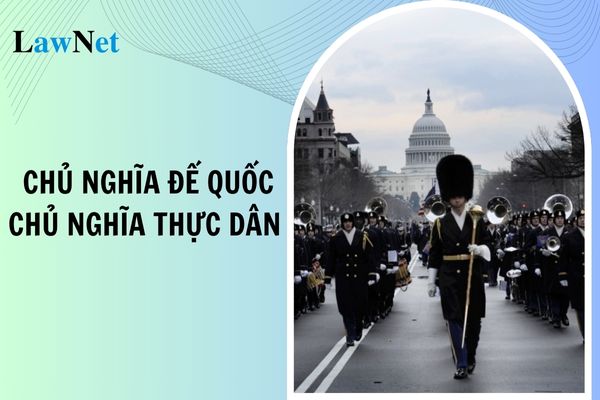How to distinguish Imperialism and Colonialism? What is the purpose of assessing educational results of students in History subject in Vietnam?
How to distinguish Imperialism and Colonialism?
Imperialism and Colonialism both originated from Europe and thrived in previous centuries. Below is a distinction between Imperialism and Colonialism.
Students may refer to the following table distinguishing Imperialism from Colonialism:
| Criteria | Colonialism | Imperialism |
| Definition | It is the occupation and control of one territory by another nation, often by establishing colonies and exploiting the resources of that land | It is a broader concept that includes colonialism and other forms of domination such as economic, political, and cultural control |
| Objective | Focuses on exploiting resources and economic benefits from the colonies | Expands the power and influence of a nation over others, not limited to territorial occupation |
| Methods of Control | Often uses direct control through establishing colonial governments and directly managing occupied territories | May use both direct and indirect methods of control. Indirect control is often through economic, political, and military measures without necessarily establishing a colonial government |
| Social Impact | Often leads to significant cultural and social changes in the colonies. Indigenous people may be forced to adopt the language, religion, and customs of the colonial power | Cultural and social impact may be less direct compared to colonialism. However, nations influenced by imperialism can still experience cultural and societal changes through the imposition of the values and systems of the imperial power |
Note: The content is for reference only!

How to distinguish Imperialism and Colonialism? What is the purpose of assessing educational results of students in History subject in Vietnam? (Image from the Internet)
What is the purpose of assessing educational results of students in History subject in Vietnam?
In the General Education Program for History issued with Circular 32/2018/TT-BGDDT, the purpose of evaluating educational results of students in History subject is to determine the extent to which students meet the required historical knowledge and competencies for each topic and each grade level. This evaluation then guides the adjustment of teaching and learning activities to achieve the program's objectives.
Evaluation activities should encourage students' passion for learning, exploring, and discovering historical issues; help students gain additional confidence and creativity in learning.
The evaluation content should focus on the ability to creatively apply historical knowledge learned in specific situations, not emphasizing the recall of historical knowledge or rote memorization.
Through evaluation, teachers can grasp the learning situation, and the level of differentiation in students' academic proficiency within a class, thereby providing assistance for students who have not met the knowledge and competence requirements, identifying and nurturing gifted students in history, and simultaneously adjusting and perfecting historical education methods.
Regarding the form of evaluation, it should combine continuous and periodic evaluations, include both teacher assessment and self-assessment by students; combine oral tests, written tests, practical assignments, research projects; and integrate both objective tests and essay assessments.
What is the implementation duration of the History program of upper secondary level in Vietnam?
According to the General Education Program for History issued with Circular 32/2018/TT-BGDDT, the duration for each class is 105 lessons per academic year, taught over 35 weeks. The duration allocated for the core content topics is 70 lessons. The projected percentage of time allocated for each content area is as follows:
| Content Area | Grade 10 | Grade 11 | Grade 12 |
| CAREER ORIENTATION TOPICS | |||
| - History and Historiography | 8% | ||
| - Role of Historiography | 8% | ||
| WORLD HISTORY | |||
| - Some ancient and medieval world civilizations | 10% | ||
| - Industrial revolutions in world history | 10% | ||
| - Bourgeois revolutions and the development of capitalism | 10% | ||
| - Formation and development of socialism | 10% | ||
| - The world during and after the Cold War | 8% | ||
| - Socio-economic development of the US from 1945 to present | 7% | ||
| - China's reform and opening up from 1978 to present | 7% | ||
| SOUTHEAST ASIAN HISTORY | |||
| - Southeast Asian civilization | 8% | ||
| - The process of national independence attainment by Southeast Asian countries | 8% | ||
| - ASEAN: Historical stages | 8% | ||
| VIETNAMESE HISTORY | |||
| - Some civilizations on Vietnamese land (before 1858) | 16% | ||
| - Community of Vietnamese ethnic groups | 10% | ||
| - Wars for national defense and liberation in Vietnamese history (before the August Revolution of 1945) | 12% | ||
| - Vietnamese villages and communes in history | 10% | ||
| - Major reforms in Vietnamese history (before 1858) | 12% | ||
| - History of defending sovereignty, rights, and legitimate interests of Vietnam in the East Sea | 8% | ||
| - August 1945 Revolution, wars for national liberation and defense in Vietnamese history (from August 1945 to present) | 12% | ||
| - Renovation in Vietnam from 1986 to present | 10% | ||
| - History of Vietnam's foreign relations | 10% | ||
| - Ho Chi Minh in Vietnamese history | 8% | ||
| PERIODIC ASSESSMENT | 10% | 10% | 10% |
| PRACTICAL HISTORY | 20% | 20% | 20% |

